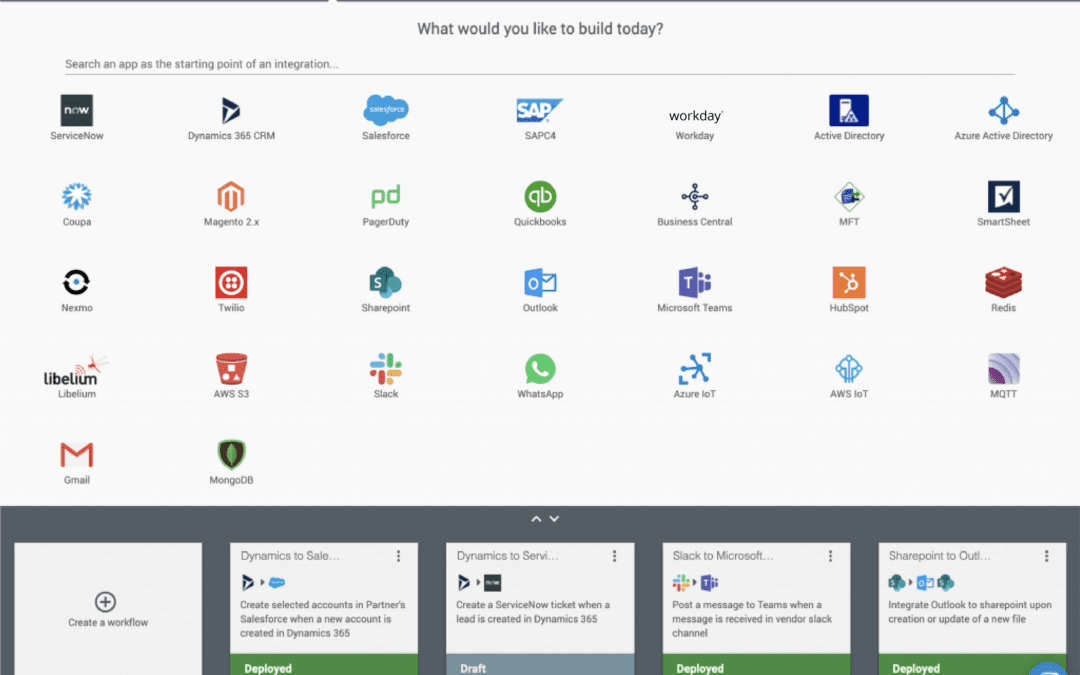
API Application Integration Data Integration IPaaS Middleware SaaS SAAS Integration Uncategorized
Last week, RoboMQ launched its last release of Connect iPaaS for 2019. This release was named Michelangelo, after the famed renaissance sculptor and painter of the Sistine Chapel in the Vatican. Michelangelo is the third release to go live this year since the launch of Connect iPaaS in Q1, 2019. It is a major release that added a truckload of features and functionalities, covering core platform capabilities as well as the addition of many new API connectors for leading CRM, SaaS, analytics, databases and IoT applications.
In this blog, we will the cover major additions and functionalities of Connect iPaaS under the following sections:
Several new features are added to the core Connect iPaaS platform that are available across each of the ecosystems or the application API connectors supported by it. These new features provide major enhancements to the way workflows are designed.
Some of the newly added features like conditionals, selective update and delete (in conjunction with the existing event filter functionality) provide powerful UX constructs that apply complex logic and conditional processing. These capabilities are more typical of BPM (Business Process Management) and BPEL (Business Process Execution Language), which are offered in a simple, intuitive and easy way for a business or a non-technical user.
Conditionals are the expression of selection criteria, or if-then-else logic, applied to actions or tasks in event processing. Previous to this release, Connect iPaaS supported adding selection criteria to event triggers, called a filter. When filters (or selection criteria) are applied to an event trigger, a user can choose which events of interest will be processed down the workflow. Conditionals, on the other hand, are applied individually to each of the actions or tasks that are executed in response to the event trigger. By using conditionals, each of the actions can select which events will be acted upon by that action.
For example, take ServiceNow as an application where a “New Incident” is created. The new incident is the event trigger. We may want to only select the incidents that are related to the value “Network”. This can be done by applying the “Event Filter” that selects incidents where “Category” is equal to “Network” as shown below.
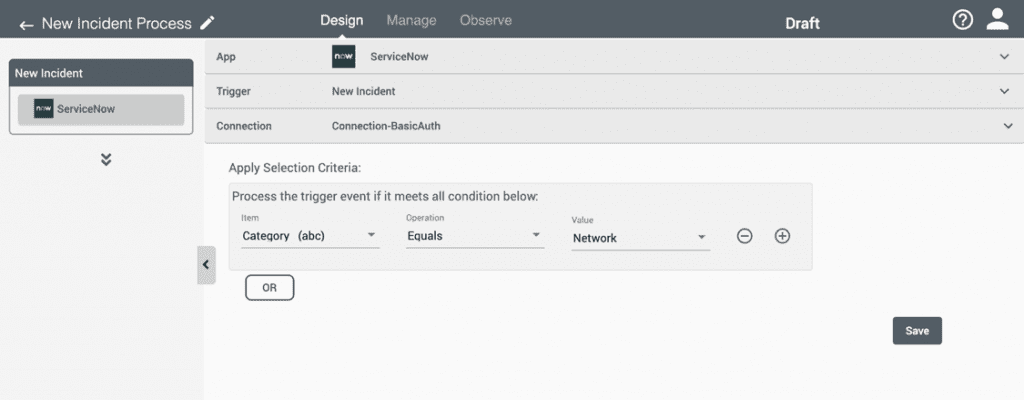
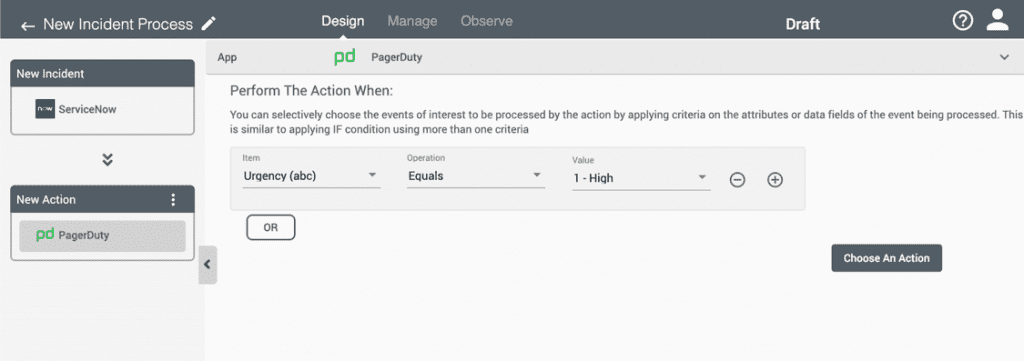
“Conditionals” is a powerful feature that allows you to take multiple actions in response to an event trigger, and each one of the actions designates the set of events that it prefers to act on. In addition to the above example, one may want to add an SMS action to notify the in-house support team for network incidents of medium urgency by using the conditional, “Urgency equals Medium”, for the SMS action in this workflow.
Continuing the theme of providing complex conditional processing and execution logic that is typical of enterprise grade BPM platforms, Connect iPaaS has added the capability to apply selection criteria when updating or deleting entities or objects in a CRM, ERP or other SaaS application. Often a workflow will have an action that updates or deletes entities in response to a trigger event. Using selective update, users can select the specific entity based on certain attributes of the trigger.
In the example below, a Microsoft Dynamics 365 account is updated in response to an account updated in Salesforce which meets the following conditions – 1) the Account Number starts with X12B and 2) the Account Rating is Default.
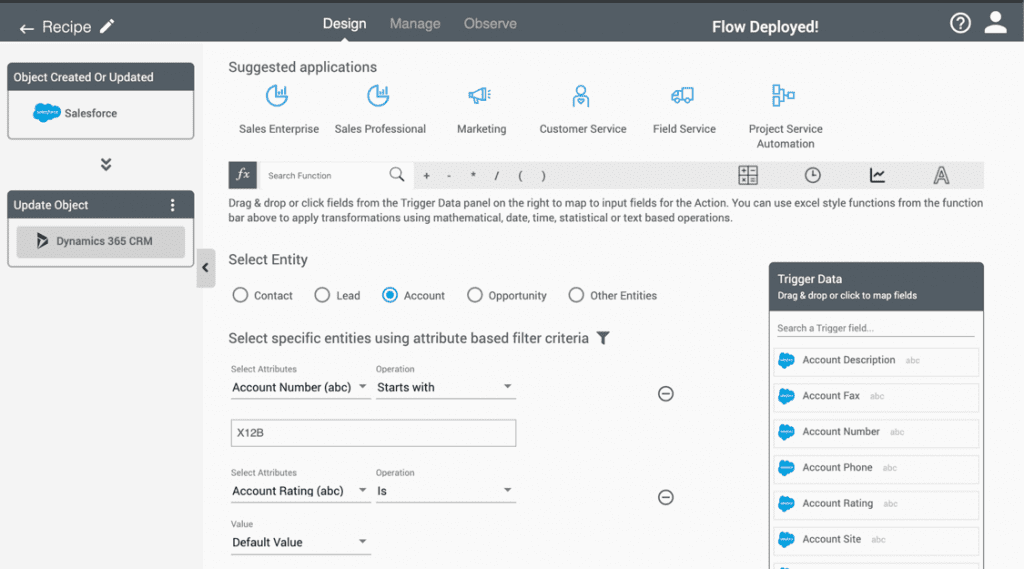
An important value creating activity in building API and data integration workflows is the ability to mesh data and apply transformations among multiple application systems. Many of the users of Connect iPaaS are business users and are often very comfortable with Microsoft Excel. We therefore decided to provide Excel style functions for data transformation and mapping. Excel style functions offers a power paradigm for ease of use in data mapping and transformation with absolutely no learning curve.
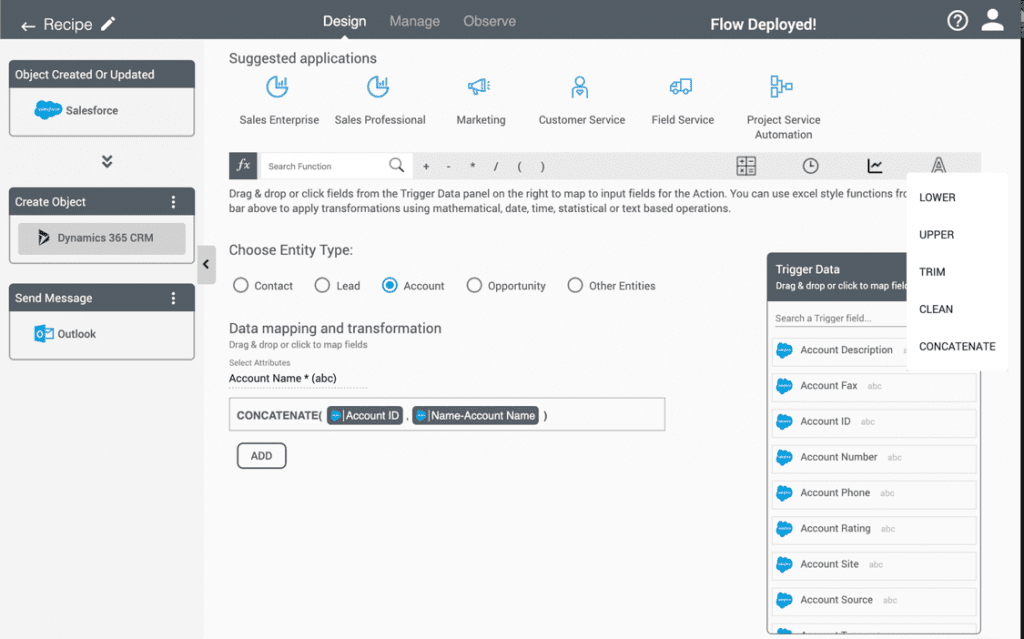
In the application integration space, file-based integration, extract processing, bulk data export and imports are some of most common integration scenarios. In this release, we have added full support of file and extract processing. Users can generate an extract of data from ERP and CRM systems like Salesforce and Dynamics 365 based on their preferred schedule and conditions. Users can also select the output fields in the extract. The generated extract or bulk data feed can then be processed by file-based connectors or be saved to data stores like AWS S3 or SFTP servers.
Bulk data processing, in conjunction with Managed File Transfer (MFT) and connectors like S3, provides a powerful use case for data loading and ETL style file processing using APIs.
In addition to the above, multiple enhancements have been done to Connect iPaaS to provide new incremental functionality, or to improve the User Experience (UX). Some of the notable improvements are:
Last but not least, a large number of ERP and SaaS application connectors including analytics, databases and IoT gateways have been added as part of the Michelangelo release. These include:
Sign up a free trial to check out the new Connect iPaaS at https://trial.robomq.io/connect/ — and let us know what you think. Please feel free to contact us at sales@www.robomq.io for setting up a session with an expert to discuss your specific integration needs today!

API Application Integration Data Integration IPaaS Middleware SaaS SAAS Integration Uncategorized